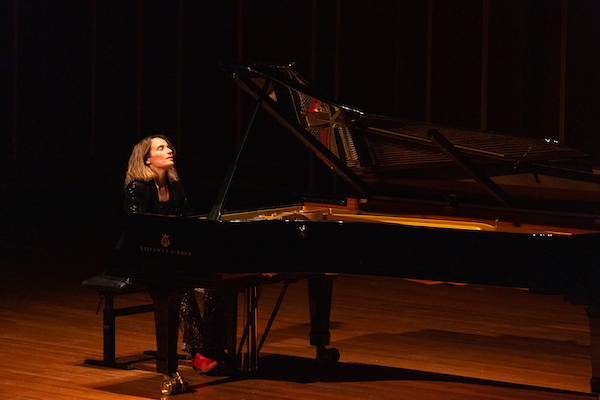Concert Review: Pianist Hélène Grimaud — Combining Gritty Force and Dark Ecstasy
By Aaron Keebaugh
Hélène Grimaud’s performances of Brahms, Busoni, and Beethoven drew on the strengths of her boldly imaginative powers, which have only deepened over the past two decades.

Pianist Hélène Grimaud at Jordan Hall. Photo: Robert Torres
Pianist Hélène Grimaud doesn’t make a habit of listening to her own recordings. Instead, she prefers to approach the most well-trodden scores with fresh eyes in front of an audience. Doing so involves interpretive whim as much as it does disciplined routine. Thus her performances are more an act of creation than re-creation. She renders every piece with a personal twist, leaving it to spontaneity to supply musical vigor and nuance.
Predictably, sometimes that approach generates puzzling interpretations. But when it succeeds, as in her recent Boston recital debut at Jordan Hall, her performance effectively combines gritty force and dark ecstasy. Presented by the Celebrity Series, Grimaud’s renditions of compositions by Brahms, Busoni, and Beethoven drew on the strengths of her boldly imaginative powers, which have only deepened over the past two decades.
What Grimaud may have previously lacked in expressive subtlety is remedied by her firm and unapologetically forceful tone and technique. In general, she eschews intellectual distance in favor of emotional intensity. Thus, while her phrases can sometimes come off as turgid or clipped, a passionate weight and dramatic gravity undergirds her blazing runs and arpeggios.
That said, her reading of Brahms’s Intermezzos, Op. 117 displayed a less than typical flair for radiance and lyricism. Shaped with generous rubato, the first of these works sang urgently — the inner lines rose clearly to the fore. In the second, her cascading flourishes coursed fervently without coming across as grandiose. Grimaud stretched her phrases even more in the third, instilling a wayward tension. This was an almost operatic vision of Brahms, accompanied by a gratifying sense of long-range build-up and release.
Brahms’s The Seven Fantasies, Op. 116 showcased an unconventional bravura. True, these character pieces in all but name explore a deeply personal eloquence, albeit with frequent descents into darkness. Grimaud leaned into every ferocious mood swing. The Capriccios surged and ebbed with wild abandon. Yet even the Intermezzos, with their congenial sweetness and melancholy, compelled, infused by the pianist with a restive angst that churned just beneath the surface. The second Intermezzo blazed with fiery delicacy; the fourth channeled an uncharacteristically fervid warmth. Fleeting moments of cool distance in that performance were all the more striking because they unexpected, decisions that were seemingly made in the moment.
Busoni’s transcription of the Chaconne from Bach’s Partita No. 2 in D minor also see-sawed between Romantic sweep and technical niceties. Grimaud made a spectacle out of the simplest gestures: left-hand octaves answered her right-hand arpeggios with almost demonic force. Despite this, the music never sounded untethered or pulled out out of character. Trills flitted in a fanciful play between hands, and her feel for texture and timbre underlined her improvisatory zeal.
Grimaud approached Beethoven’s Piano Sonata No. 30 with a similar flair for the unexpected. With this work, the composer embraced joie de vivre after completing the weightier Hammerklavier Sonata. Despite this, Grimaud managed to cultivate surprise and urgency. Her percussive tone threw all gradations in texture overboard. There was little room for happy solace as the moods crested in huge waves before cycling around again. If at times the thrusting performance could use a greater play of color, the culminating variations, which ranged from hymnic serenity to comical intensity, were spot-on. Her two encores, the second of Rachmaninoff’s Etudes-Tableaux and Valentin Silvestrov’s Bagatelle No. 2, responded to what had come before with convincing consolation.
But even in the encores there was nothing flaccid or run-of-the-mill. Her performance hinted at a self-conscious, almost Gouldian restlessness: a burning desire to push against the boundaries of what is safe. Grimaud’s style is very much rooted in the art of exaggeration and excess. Emotions shift dramatically — sometimes with a manic swagger. But she channels the music through a personal vision that, at its best, never tips into self-indulgence. In an age when more and more artists are choosing a path of interpretive variance, Grimaud walks her own distinctive high wire with assured daring.
Aaron Keebaugh has been a classical music critic in Boston since 2012. His work has been featured in the Musical Times, Corymbus, Boston Classical Review, Early Music America, and BBC Radio 3. A musicologist, he teaches at North Shore Community College in both Danvers and Lynn.
